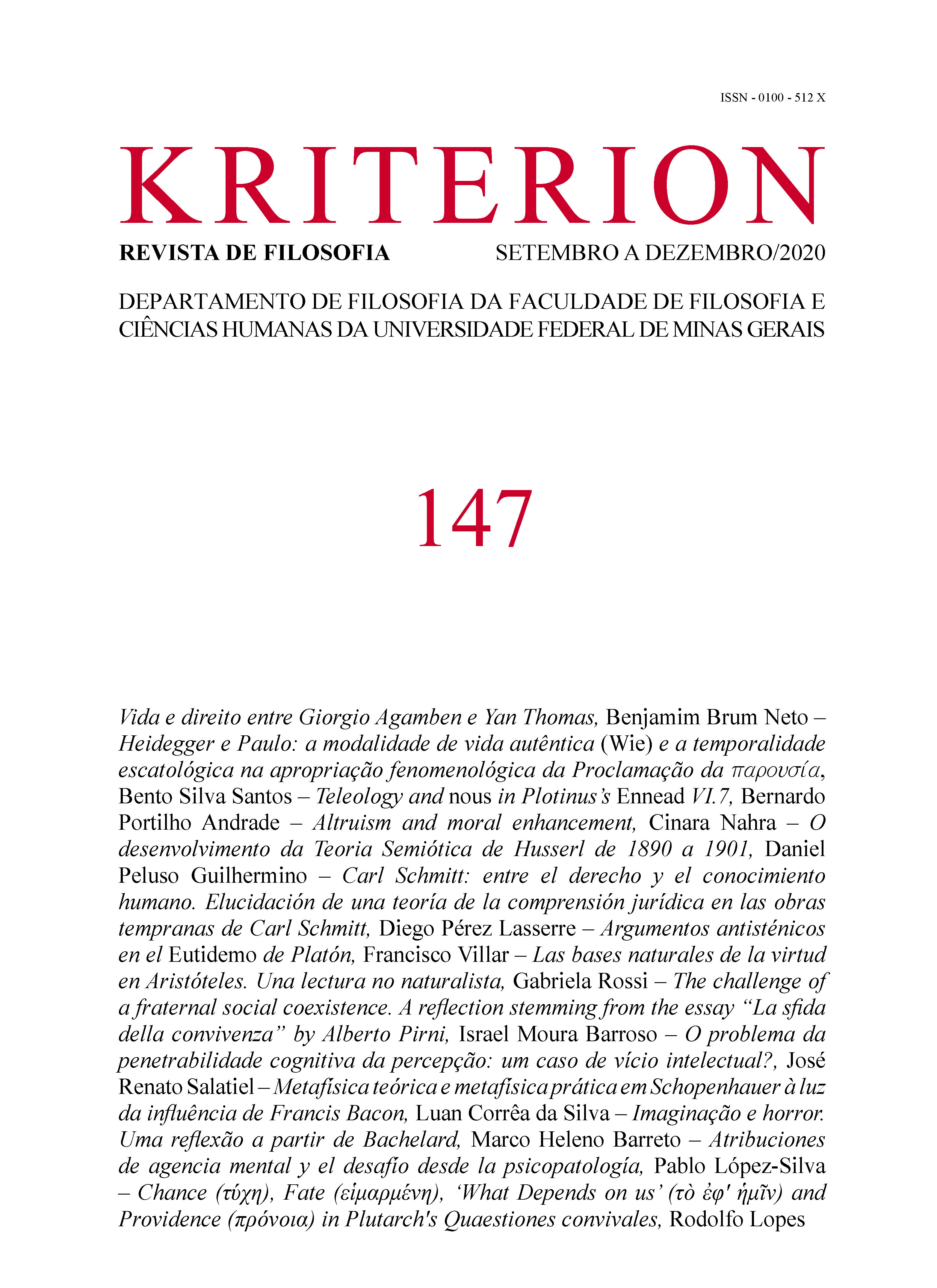ALTRUISM AND MORAL ENHANCEMENT
Palavras-chave:
Altruism, Altruistic behaviour, Altruistic motivation, Moral Enhancement, Human NatureResumo
In this article I will be discussing what altruism is, distinguishing altruistic motivations (pure and impure) and altruistic behaviour (soft and robust). Pure altruism is when the motivation to benefit another is exclusively to increase the other´s welfare, and impure altruism is when the motivation to benefit another is solely to increase your own wellbeing, or includes on some level, increasing your own welfare. Soft altruism is helping behaviour and robust altruism is improving the welfare of another individual at the expense of the altruist. Having made these distinctions I move on to show that altruism is a requirement of morality. I argue that the three main principles of morality (categorical imperative, golden rule and the greatest happiness principle) are not only compatible with, but also recommend soft altruism. Finally I argue that the probability of people continuing to practise altruistic acts is higher when we are purely motivated, and if that is the case not only classic moral enhancement but also biotechnological moral enhancement can have a role in bringing people over to the altruistic side, stimulating their ‘other regarding’ motivations, thus contributing to spreading altruistic behaviour and morality throughout the world.
Referências
ANDREONI, J. “Giving with impure altruism: applications to charity and Ricardian equivalency”. The Journal of Political Economy, Vol. 97, Nr. 6, pp. 1447-1458, 1989.
BATSON, D. et al. “Empathy and Altruism”. In: C. Sny e S. Lopes (ed.), pp. 485-498, 2002.
BATSON, D.; LISHNER, D.; STOCKS, E. “The empathy altruism hypothesis”. Oxford: Oxford University Press, 2014. Printed from Oxford Handbooks Online. pp. 1-27.
CHANG, S. et al. “Neural mechanisms of social decision making in the primate amygdala”. PNAS, Vol. 112, Nr. 52, pp. 16012-16017, 2015.
CRISP, R. et al. (eds.) “Ética aplicada e políticas públicas”. Florianópolis: EDUFSC, 2018.
DE WAAL, F. “Putting the altruism back into altruism: the evolution of empathy”. Annu. Rev. Psychol. Vol. 59, pp. 279-300, 2008.
DE WAAL, F., PRESTON, S. “Mammalian empathy: behavioural manifestations and neural basis”. Nature Reviews, Vol. 18, pp. 498-508, 2017.
DOUGLAS, T. “Moral Enhancement”. Journal of Applied Philosophy, Vol. 25, Nr. 3, pp. 228-245, 2008.
____________. “Moral enhancement via direct emotion modulation: a reply to John Harris”. Bioethics, Vol. 27, Nr. 3, pp. 160-168, 2013.
_____________. “Moral Bioenhancement, Freedom and Reasoning”. Journal of Medical Ethics, Vol. 40, Nr. 6, pp. 359-360, 2014.
HARRIS, J. “Moral enhancement and freedom”. Bioethics, Vol. 25, pp. 102-11, 2011.
_____________. “Moral progress and moral enhancement”. Bioethics, Vol. 27, Nr. 5, pp. 285-90, 2013.
KANT, I “Groundwork of the Metaphysics of Morals”. Cambridge: Cambridge University Press, 1998, [1785] (GMS AA 04).
MARSH, A. “Neural, cognitive, and evolutionary foundations of human altruism”. WIREs Cogn Science, Vol. 7, pp. 59-71, 2016.
MARSH, A. et al. “Neural and cognitive characteristics of extraordinary altruists”. PNAS, Vol. 111, Nr. 42, pp. 1-6, 2014.
NAHRA, C. “Políticas públicas para o aprimoramento do altruísmo”. In: CRISP, R. et al. (ed.), pp. 61-76, 2018.
OARKLEY, B. et al. (eds.). “Pathological altruism”. Oxford: Oxford University Press, 2012.
PFAFF, D.; SHERMAN, S. “The Altruistic Brain”. Oxford: Oxford University Press, 2015.
PRESTON, S. “The origins of altruism in off spring care”. Psychological Bulletin, Vol. 139, Nr. 6, pp. 1305-1341, 2013.
RAKIC, V. “Voluntary moral enhancement and the survival-at-any cost bias”. Journal of Medical Ethics, Vol. 40, Nr. 4, pp. 246-250, 2014.
RICE, G.; GAINER, P. “Altruism in the albino rat”. J. Comp. Physiol. Psychol., Vol. 55, pp. 123-125, 1962.
RICKEMBACKER, E. et al. “Freezing suppression by oxytocin in central amygdala allows alternate defensive behaviours and mother-pup interactions”. eLife, 13 June 2017 (Online). Available at https://elifesciences.org/articles/24080.
SAVULESCU, J.; PERSON, I. “The perils of cognitive Enhancement and the Urgent Imperative to Enhance the Moral Character of Humanity”. Journal of Applied Ethics, Vol. 25, Nr. 3, pp. 162-177, 2008.
______. “Unfit for the Future”. Oxford: Oxford University Press, 2012a.
______. “Moral enhancement, freedom, and the god machine”. Monist, Vol. 95, Nr. 3, pp. 399-421, 2012b.
______. “Enharrisment: A Reply to John Harris about Moral Enhancement”. Neuroethics, Vol. 9, Nr. 3, pp. 275-277, 2016.
______. “The Duty to be morally enhanced”. Topoi, Vol. 38, Nr. 1, pp. 7-14, March 2019 (Online). Available at https://link.springer.com/article/10.1007/s11245-017-9475-7.
______. “The moral importance of reflective empathy”. Neuroethics, Vol. 11, pp. 183-193, 2018.
SNYDER, C. R., LOPES, S. J. (eds.). “Handbook of Positive Psychology”. Oxford: Oxford University Press, 2002.
SONNE, J.; GASH, D. “Psychopathy to altruism: neurobiology of the selfishselfless spectrum”. Frontiers in Psychology, Vol. 9, pp. 1-18, April 2018.










